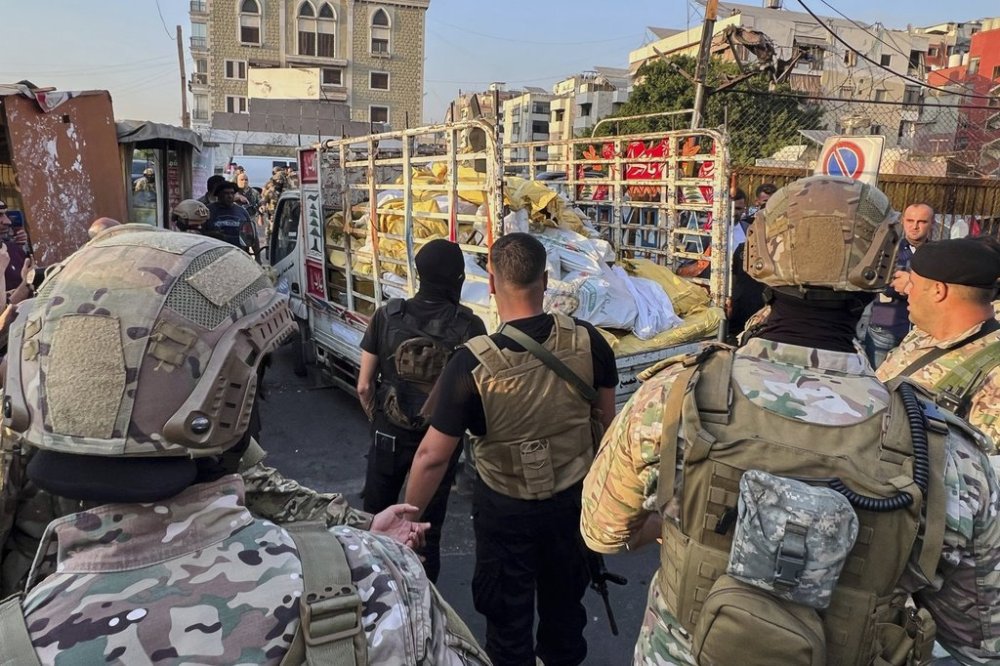Palestinian factions begin handing over weapons at Beirut refugee camp
Advertisement
Read this article for free:
or
Already have an account? Log in here »
To continue reading, please subscribe:
Monthly Digital Subscription
$0 for the first 4 weeks*
- Enjoy unlimited reading on winnipegfreepress.com
- Read the E-Edition, our digital replica newspaper
- Access News Break, our award-winning app
- Play interactive puzzles
*No charge for 4 weeks then price increases to the regular rate of $19.00 plus GST every four weeks. Offer available to new and qualified returning subscribers only. Cancel any time.
Monthly Digital Subscription
$4.75/week*
- Enjoy unlimited reading on winnipegfreepress.com
- Read the E-Edition, our digital replica newspaper
- Access News Break, our award-winning app
- Play interactive puzzles
*Billed as $19 plus GST every four weeks. Cancel any time.
To continue reading, please subscribe:
Add Free Press access to your Brandon Sun subscription for only an additional
$1 for the first 4 weeks*
*Your next subscription payment will increase by $1.00 and you will be charged $16.99 plus GST for four weeks. After four weeks, your payment will increase to $23.99 plus GST every four weeks.
Read unlimited articles for free today:
or
Already have an account? Log in here »
BEIRUT (AP) — Palestinian factions started handing over some of the weapons held in a refugee camp on the outskirts of Beirut to the Lebanese army on Thursday, an initial step in implementing a plan officials announced three months earlier for removing arms from the camps.
It was a modest first step. One pickup left the camp loaded with weapons packed in bags. The butts of machine guns could be seen protruding from some of the sacks, while others contained rocket-propelled grenades.
The removal of weapons from the camps was announced in May during a visit by Palestinian President Mahmoud Abbas to Lebanon, during which he and Lebanese President Joseph Aoun announced that arms would be consolidated under the authority of the Lebanese government.

But not all Palestinian factions have agreed to abide by the decision.
Representatives of Hamas and the allied Palestinian Islamic Jihad did not respond to requests for comment.
A spokesperson for Hamas sent a statement signed by “the Palestinian Factions in Lebanon” that called Thursday’s handover of weapons “an internal organizational matter within the Fatah movement” that “has no connection, near or far, to the issue of Palestinian weapons in the camps.”
It added, “Our weapons have always been and will always be linked to the right of return and the just Palestinian cause and will remain so as long as the occupation remains on Palestinian soil.”
The 12 Palestinian refugee camps in Lebanon aren’t under the control of Lebanese authorities, and rival groups have clashed inside the camps in recent years, inflicting casualties and affecting nearby areas. Palestinian groups have also periodically launched rockets across the border into Israel.
The step of removing weapons from the camps was seen as a precursor to the much more difficult step of disarming the Lebanese militant group Hezbollah, which last year fought a bruising war with Israel . The group has been under domestic and international pressure since then to give up its remaining arsenal, which it has so far refused to do.
Implementation of the plan for the Palestinian camps was delayed amid disagreements among and within the various Palestinian factions operating in Lebanon, which include Abbas’ Fatah movement, the rival Hamas group and a range of other Islamist and leftist groups, over the mechanism for handing over the weapons.
Ramez Dimashkieh, head of the Lebanese-Palestinian Dialogue Committee, a government body that serves as an interlocutor between Palestinian refugees and officials, said in a statement that the handover of weapons Thursday at the Burj al-Barajneh camp south of Beirut “will be the first step, with further batches to be delivered in the coming weeks from Burj al-Barajneh camp and the rest of the camps,” the statement said.
Nabil Abu Rdeneh, a spokesperson for Abbas, said in a statement that weapons were also handed over Thursday at al-Bass camp in southern Lebanon and would continue in other camps in implementation of the agreement between Abbas and the Lebanese government.

U.S. envoy Tom Barrack congratulated the Lebanese government and Fatah “for their agreement on voluntary disarmament in Beirut camps.” In a post on X, he called it “a historic step toward unity and stability, showing true commitment to peace and cooperation.”
However, the extent to which the decision would actually be implemented remained unclear. Some officials with the Palestinian factions said only “illegal” weapons would be handed over, not those belonging to organized factions. They also said personal light weapons would not be included.
Badih al-Habet, a spokesperson for Fatah in Beirut, told reporters that Aoun had acknowledged that “personal weapons are part of Arab and national culture.”
There are nearly 500,000 Palestinians registered with UNRWA, the United Nations agency for Palestinian refugees, in Lebanon. However, the actual number in the country is believed to be around 200,000, as many have emigrated but remain on the organiztion’s roster.
They are prohibited from working in many professions, have few legal protections and can’t own property.

